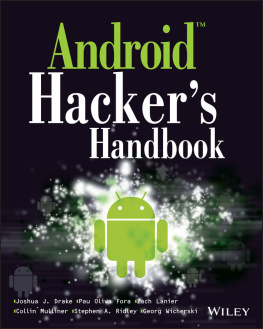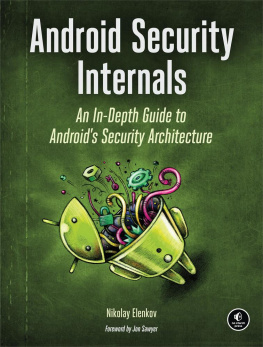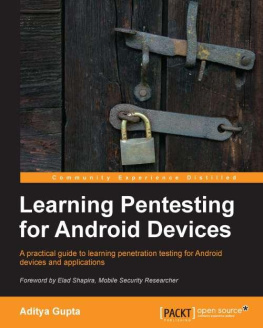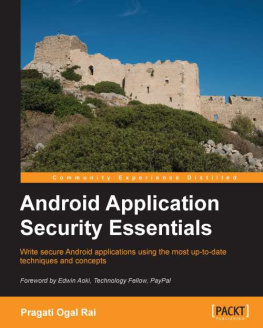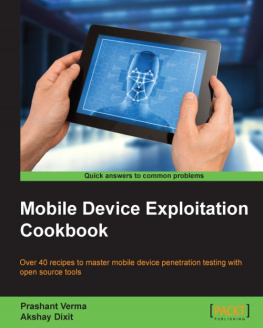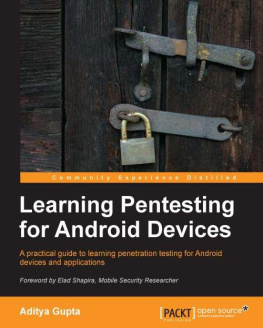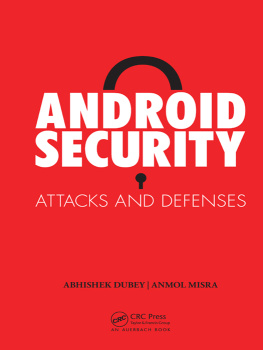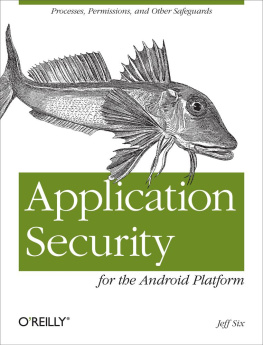
Android Hacker's Handbook
Published by
John Wiley & Sons, Inc.
10475 Crosspoint Boulevard
Indianapolis, IN 46256
www.wiley.com
Copyright 2014 by John Wiley & Sons, Inc., Indianapolis, Indiana
ISBN: 978-1-118-60864-7
ISBN: 978-1-118-60861-6 (ebk)
ISBN: 978-1-118-92225-5 (ebk)
No part of this publication may be reproduced, stored in a retrieval system or transmitted in any form or by any means, electronic, mechanical, photocopying, recording, scanning or otherwise, except as permitted under Sections 107 or 108 of the 1976 United States Copyright Act, without either the prior written permission of the Publisher, or authorization through payment of the appropriate per-copy fee to the Copyright Clearance Center, 222 Rosewood Drive, Danvers, MA 01923, (978) 750-8400, fax (978) 646-8600. Requests to the Publisher for permission should be addressed to the Permissions Department, John Wiley & Sons, Inc., 111 River Street, Hoboken, NJ 07030, (201) 748-6011, fax (201) 748-6008, or online at http://www.wiley.com/go/permissions.
Limit of Liability/Disclaimer of Warranty: The publisher and the author make no representations or warranties with respect to the accuracy or completeness of the contents of this work and specifi cally disclaim all warranties, including without limitation warranties of fi tness for a particular purpose. No warranty may be created or extended by sales or promotional materials. The advice and strategies contained herein may not be suitable for every situation. This work is sold with the understanding that the publisher is not engaged in rendering legal, accounting, or other professional services. If professional assistance is required, the services of a competent professional person should be sought. Neither the publisher nor the author shall be liable for damages arising herefrom. The fact that an organization or Web site is referred to in this work as a citation and/or a potential source of further information does not mean that the author or the publisher endorses the information the organization or Web site may provide or recommendations it may make. Further, readers should be aware that Internet Web sites listed in this work may have changed or disappeared between when this work was written and when it is read.
For general information on our other products and services please contact our Customer Care Department within the United States at (877) 762-2974, outside the United States at (317) 572-3993 or fax (317) 572-4002.
Wiley publishes in a variety of print and electronic formats and by print-on-demand. Some material included with standard print versions of this book may not be included in e-books or in print-on-demand. If this book refers to media such as a CD or DVD that is not included in the version you purchased, you may download this material at http://booksupport.wiley.com. For more information about Wiley products, visit www.wiley.com.
Library of Congress Control Number: 2013958298
Trademarks: Wiley and the Wiley logo are trademarks or registered trademarks of John Wiley & Sons, Inc. and/or its affi liates, in the United States and other countries, and may not be used without written permission. Android is a trademark of Google, Inc. All other trademarks are the property of their respective owners. John Wiley & Sons, Inc., is not associated with any product or vendor mentioned in this book.
About the Authors
Joshua J. Drake is a Director of Research Science at Accuvant LABS. Joshua focuses on original research in areas such as reverse engineering and the analysis, discovery, and exploitation of security vulnerabilities. He has over 10 years of experience in the information security field including researching Linux security since 1994, researching Android security since 2009, and consulting with major Android OEMs since 2012. In prior roles, he served at Metasploit and VeriSign's iDefense Labs. At BlackHat USA 2012, Georg and Joshua demonstrated successfully exploiting the Android 4.0.1 browser via NFC. Joshua spoke at REcon, CanSecWest, RSA, Ruxcon/Breakpoint, Toorcon, and DerbyCon. He won Pwn2Own in 2013 and won the DefCon 18 CTF with the ACME Pharm team in 2010.
Pau Oliva Fora is a Mobile Security Engineer with viaForensics. He has previously worked as R+D Engineer in a wireless provider. He has been actively researching security aspects on the Android operating system since its debut with the T-Mobile G1 on October 2008. His passion for smartphone security has manifested itself not just in the numerous exploits and tools he has authored but in other ways, such as serving as a moderator for the very popular XDA-Developers forum even before Android existed. In his work, he has provided consultation to major Android OEMs. His close involvement with and observation of the mobile security communities has him particularly excited to be a part of pulling together a book of this nature.
Zach Lanier is a Senior Security Researcher at Duo Security. Zach has been involved in various areas of information security for over 10 years. He has been conducting mobile and embedded security research since 2009, ranging from app security, to platform security (especially Android), to device, network, and carrier security. His areas of research interest include both offensive and defensive techniques, as well as privacy-enhancing technologies. He has presented at various public and private industry conferences, such as BlackHat, DEFCON, ShmooCon, RSA, Intel Security Conference, Amazon ZonCon, and more.
Collin Mulliner is a postdoctoral researcher at Northeastern University. His main interest lies in security and privacy of mobile and embedded systems with an emphasis on mobile and smartphones. His early work dates back to 1997, when he developed applications for Palm OS. Collin is known for his work on the (in)security of the Multimedia Messaging Service (MMS) and the Short Message Service (SMS). In the past he was mostly interested in vulnerability analysis and offensive security but recently switched his focus the defensive side to develop mitigations and countermeasures. Collin received a Ph.D. in computer science from Technische Universitt Berlin; earlier he completed his M.S. and B.S. in computer science at UC Santa Barbara and FH Darmstadt.
Ridley (as his colleagues refer to him) is a security researcher and author with more than 10 years of experience in software development, software security, and reverse engineering. In that last few years Stephen has presented his research and spoken about reverse engineering and software security on every continent (except Antarctica). Previously Stephen served as the Chief Information Security Officer of Simple.com, a new kind of online bank. Before that, Stephen was senior researcher at Matasano Security and a founding member of the Security and Mission Assurance (SMA) group at a major U.S defense contractor, where he specialized in vulnerability research, reverse engineering, and offensive software in support of the U.S. Defense and Intelligence community. At present, Stephen is principal researcher at Xipiter (an information security R&D firm that has also developed a new kind of low-power smart-sensor device). Recently, Stephen and his work have been featured on NPR and NBC and in Wired, the Washington Post, Fast Company, VentureBeat, Slashdot, The Register, and other publications.
Georg Wicherski is Senior Security Researcher at CrowdStrike. Georg particularly enjoys tinkering with the low-level parts in computer security; hand-tuning custom-written shellcode and getting the last percent in exploit reliability stable. Before joining CrowdStrike, Georg worked at Kaspersky and McAfee. At BlackHat USA 2012, Joshua and Georg demonstrated successfully exploiting the Android 4.0.1 browser via NFC. He spoke at REcon, SyScan, BlackHat USA and Japan, 26C3, ph-Neutral, INBOT, and various other conferences. With his local CTF team 0ldEur0pe, he participated in countless and won numerous competitions.
Next page
